James Brown
July 24, 1988
To Diane Hubbard and the very helpful people at Hubbard
Harpsichords, Inc.
Kit #2098, a French double-manual harpsichord after P.
Taskin with a transposing keyboard, peau de buffle register and a Louis XVI apron stand
arrived at my house April 10, 1985. On November 11, 1987 I made my final entry in my
construction log after 1000 hours of enjoyment seasoned with blood, sweat, and tears.
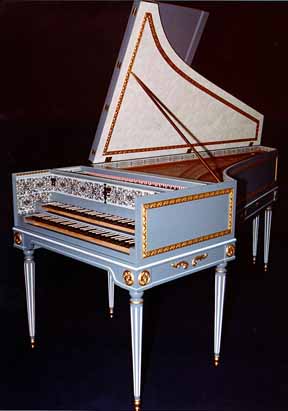 The kit's
instructions and organization were abundantly clear and concise. The selection of
materials and the finish of the parts and subassemblies were of the highest quality. In
addition, the friendly and very helpful assistance of each member of your organization to
whom I spoke leads me to recommend this kit without reservation. Thank you for the
beginning of a great life-time experience. You may be interested to know some of the
details of construction.
The kit's
instructions and organization were abundantly clear and concise. The selection of
materials and the finish of the parts and subassemblies were of the highest quality. In
addition, the friendly and very helpful assistance of each member of your organization to
whom I spoke leads me to recommend this kit without reservation. Thank you for the
beginning of a great life-time experience. You may be interested to know some of the
details of construction.
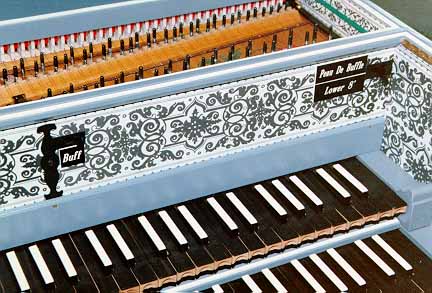
I chose to finish the instrument in an 18th century motif
using Benjamin Moore 18th-Century Heritage paints sprayed over a Gesso base and handrubbed
(oh my aching back) to a matte finish. Gold trim was incorporated with the Flemish papers.
I painted the soundboard in a French-style floral pattern as designed by Shiela Barnes
using the gum arabic and dry pigment method. The underside of the lid is covered with a
floral-design wall paper. When I can find the time, it will be removed and replaced with a
suitable painting.
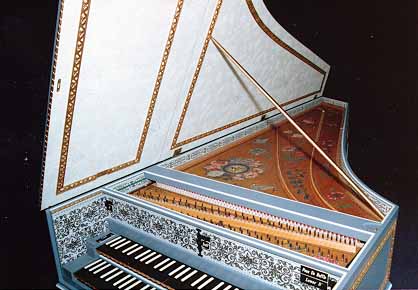
Stringing the instrument went better than anticipated with
the exception of the top two strings in the 4' choir. I could not bring them up to full
pitch without breaking them. I've strung and tuned violins for many years and am aware of
the need for gradual stretching of new wire. I eventually substituted .0067-inch wire for
the .0008-inch wire and have had no problems since.
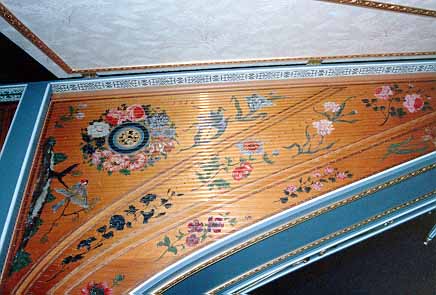
This instrument made its debut to the public at our
church's annual choral Christmas service last December. I direct its 40-voice choir and
all gave high praise to the Hubbard's sound in its accompaniment of several 18th-century
choral selections. It also performed beautifully for the soprano recitative from Handel's
Messiah. The response from the congregation was overwhelming. We literally had to sneak
the instrument out of the building afterward as several people, including the senior
pastor, wanted it to stay in the chancel as a permanent addition to our sanctuary and
music program. Needless to say, we already have plans to use it in next Christmas' special
services.
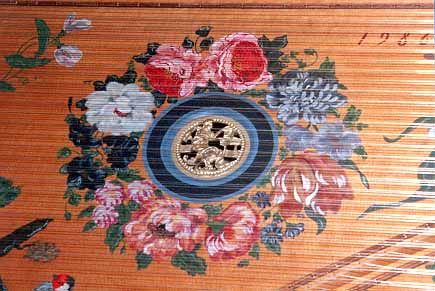
The construction of this kit, the notoriety that it has
brought me, the magnificence of its sound, and the pleasure I get from studying how to
play it have been one of the highlights of my life. The spirit of Frank Hubbard lives on
in the dedication of his wife, the commitment of the people of Hubbard Harpsichords and in
the beauty of the instrument.
James L. Brown
Minneapolis, Minnesota
Note: In the close-up photos of the keyboards one can see
that Mr. Brown has labeled the various stop levers, e.g., beau de buffle, coupler. He
wrote: "Remembering the location and function of stop levers was difficult for
first-time players. Since many of the present and future players are used to locating
organ stops by their labels, I mounted engraved plates."
